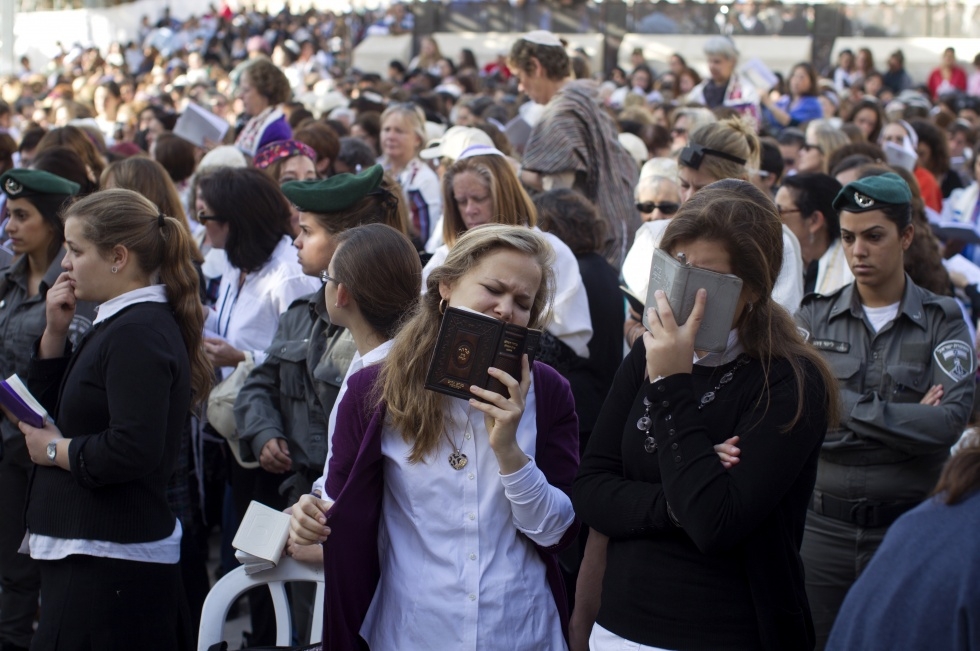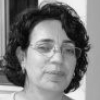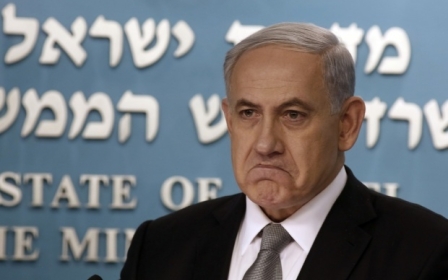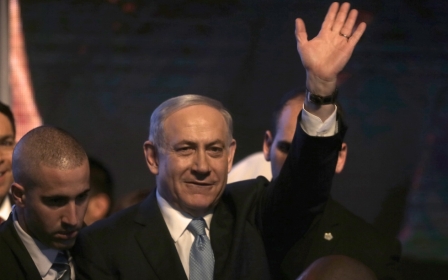Israeli Orthodox Jewish women demand representation

Election time in Israel brings us back to the politics of the public square. The system allows for small groups of invested citizens to raise issues of social concern and form parties in order to be heard, knowing that they will probably not get into parliament. The recent elections brought to the surface the struggle of Haredi (Orthodox Jewish) women. This is a group that is represented in the public discourse and in parliament by Orthodox Jewish men. Their voices and needs are not heard. Orthodox Jews make up 10 percent of Israeli society, which makes the women a silent five percent. These women vote for one of two Orthodox parties. These parties allow only men to run as representatives. Traditionally Orthodox Jews vote only for Orthodox parties. The women that came forth this year wanted to challenge their own parties and representatives.
The Haredi communities have always been part of the Israeli political system and today they are represented by the Ashkenazi United Torah Judaism and the Mizrahi Shas. Their participation is accompanied by a sense of ambivalence. They take part in the elections, but hand in hand they are cautious not to be totally associated with Israeli society out of fear for their conservative values and norms. Their positions on Israeli foreign policy and the Palestinian-Israeli conflict have been flexible in the past, since the parties formally reject political secular Zionism and do not view such issues ideologically but rather theologically. Therefore, they have been able to participate in both right- and left-led coalitions. The parties’ main concerns are inward toward their communities. They take care of education, housing and social services, and recently have been active in opposing the new recruitment law that obliges Haredi men to serve in the army.
Because they are willing to sit in both left- and right-wing coalitions they have a unique bargaining position and the power to gain access to funding. This kind of political participation has proved efficient, and the two Orthodox parties have managed to make impressive gains for their voters. The women claim that the men fail to represent them. In the Israeli Knesset only 20 percent of MKs are women, but in the Haredi parties women have zero-percent representation.
In 2012, a group of brave Orthodox women launched a provocative campaign with the slogan “No voice, no vote". They did not want to look for representation outside of their communities; they wanted to create change at home. Their demands were met with an embrace from secular Jewish society and media, and with a disturbing silence from within their communities.
Prior to the 2015 elections, the much-anticipated, hot discussion in the Haredi communities began. It was mostly negative. The women’s demands were regarded as outrageous. Men, women and of course their leaders, tried to delegitimise the women who were seeking change. It is not surprising that they were accused of not being true members of the community.
The women faced the terrible threats of their children being ostricised from the communities’ school systems and being denied a good marriage arrangement. But nevertheless, they saw the attention they received as a sign of success. One Haredi publicist wrote in their favour that in 50 years, he believes there will be a Haredi woman prime minister. He noted that 50 years ago the Orthodox did not want any support from the government, and did not accept any budgets out of fear that the secular governments would control the communities.
Today the Heredi communities accept and even struggle for funding. Fifty years ago they refused to be part of any coalition and today they sit in coalitions. That is why the publicist says that 50 years from now this debate will be a thing of the past. We take it for granted, but there was a religious debate about the right of Haredi women to vote, and that too is a thing of the past. Women now vote in the general elections with the support of their religious leaders.
Racheli Ibenboim is one of the leaders of the campaign. She herself is a member of the Ultra Orthodox Gur community, and has chosen to work within its fences, which embrace, protect and limit her.
What is it you want? Is it the right to be represented?
“Not only, and maybe not mainly, although representation is a right and we are entitled to take part in all walks of life. We also want our children to grow up with women leaders as role models. But our main motivation is to fulfil our needs. We are motivated by the politics of needs more than by the politics of rights.”
What are the needs of Haredi women that are not being met?
"Our leaders have neglected us. Take for example our medical needs: Haredi women is the social group with the lowest life expectancy in Israel. For religious reasons, we do not use mass media - radio, TV or internet - so we are not exposed to information that can be lifesaving. Women also neglect going to the doctor's because, culturally, they are taught to look after everyone first, before looking after themselves. They have many children and they are working outside the home. In addition we have needs concerning training and employment opportunities: women who are expected to bring [in] an income have [fewer] opportunities to receive scholarships for higher education from the state because the state wants to encourage men to acquire a profession and to work, or maybe because the Haredi men in parliament take care of their own. There is even proof that our leaders close deals with employers in Haredi communities so that [they] give a low salary to the women who work for them, so that the women don’t have too much economic power or freedom.”
Haredi communities are built differently than most patriarchal societies. The highest regard is given to Torah scholars, and men study holy studies on a daily basis. Only 45 percent of the men work for a living, while 65 percent of the Haredi women work outside their homes. Since the women earn a very low income (compared to men and compared to non-Haredi women), this unique set of priorities creates poverty, and 70 percent of the families are below the poverty line.
Due to religious beliefs and restrictions, the families are big, with a birth rate of 6.5 children per family (compared to three in the rest of Israel). The women are expected to leave the protected environment of the community and go into the world, which they call “the general society”, but they are not expected to be at all influenced by that society. Women have traditionally worked in the educational institutions of their communities, but in recent years there is a surplus of teachers and they have acquired other professions which have exposed them more to the secular society.
The religious leaders allow this exposure for the sake of providing an income, but as Ibenboim says: “Did they think we could all be exposed to the Zionist political system, be part of the parliament, and not be influenced? The influence ... began with the decision to participate in the general political system, long before women began to voice their demands.”
The interesting thing about this campaign is that the Haredi women do not want representation outside their communities, a representation they could have had if they approached the many political parties that ran for elections. One important Haredi leader is Adina Bar Shalom, the daughter of Ovadia Yosef, the spiritual leader and founder of Shas. She has opened a college for Haredi men and women, has encouraged many women to acquire an academic education and has been a public figure for years. In the 2015 elections she was offered a seat in one of the secular Zionist parties and instead chose to stay within the boundaries of her community. Shas would not let her hold a position on the list so together with others, she established the Women Advisory Council in Shas.
In addition to these two initiatives, a third group of Haredi women ran in the last elections in a party of their own which they named “In their merit”. Their initiative is also long-term. They did not think they would get into the Knesset, at least not during this round of elections, but the issues are out there and the discussion has begun.
The price these women pay is very high, as Ibenboim mentions: “It was very hard, but we thought it would be harder. I see it as a point of honour to our communities, they were able to contain our struggle …and since we are part of the community, it was not easy to exclude us or delegitimise us. We didn’t take any money from organisations, only private funding and we kept our independence.” Most of the women who are active are married, and it is a given that all of their husbands support them.
Most of the Haredi media expressed fierce opposition. The women’s party could not even publish an ad in the Haredi papers, which are the only means of media in the community (which hardly uses electronic media). When they took the newspapers' organisations to court, they won, but the high court reversed the decision and allowed the newspapers to continue refusing to publish their ads.
All the three initiatives (the campaign, the women’s council and the women’s party) rely on religious discourse, justifications and terminology for their actions. This religious language was not chosen for strategic purposes but out of true conviction. The women would not have continued with their struggles if they had not found such theological support within their communities. Unfortunately, most of that support is given behind closed doors.
Before the 2015 elections, the women who were active with “No voice no vote” handed out pamphlets in their ultra-religious neighbourhoods. The pamphlets were written in a traditional manner, using quotes from religious leaders. And still, it was considered a success if a woman on the street dared to accept a pamphlet, and even more so if she stopped for a moment and read it.
Do you have any demands for the general Israeli society, or is all your work inward toward the Haredi society?
“We have expectations for the secular Israeli society and from the state," Ibenboim says. "The first expectation is that the state be democratic, and not allow for double standards. How can it be that the state and the courts in Israel approve a political party that excludes women to run in the elections? Why is that lawful in a country that declares itself democratic?
"Our second demand is that the non-religious society make a step towards us. We don’t want them to become religious, but we do want respect and effort. On a daily basis we hear that we need to change our ways, work more and contribute to the economy. We are accused of being parasites, but when we look for work we are the last to be hired.”
Indeed, recent research has shown that Haredi men and women are excluded from the workforce in greater rates than Arabs, a minority group which is highly descriminated against. The third demand that Ibenboim made of the majority group is that it stop imposing changes. No minority group likes to change when the changes are forced upon it.
“For example", Ibenboim says, "in the last two years the government was able to impose Haredi conscription to the army because the Haredi parties were not in government. As a result, the conscription that has been slowly on the rise in the last few years decreased. Another example is that the Minister of Education declared that the state will interfere and impose a basic curriculum in our schools. In response there was a call from our leaders to leave the secular academic institutions and [fewer] men and women from our communities enlisted in institutions of higher education.
"Those of us who want change want it to come slowly and from within; anything else is viewed as a threat to our way of life and causes a regressive reaction. The way I see it, the general society wants us to change; they don’t like minority groups which segregate themselves by choice.”
- Michal Zak is a political educator, an expert in Jewish-Palestinian dialogue and a resident of the Palestinian-Jewish community of Wahat al Salam-Neve Shalom in Israel.
Middle East Eye propose une couverture et une analyse indépendantes et incomparables du Moyen-Orient, de l’Afrique du Nord et d’autres régions du monde. Pour en savoir plus sur la reprise de ce contenu et les frais qui s’appliquent, veuillez remplir ce formulaire [en anglais]. Pour en savoir plus sur MEE, cliquez ici [en anglais].





